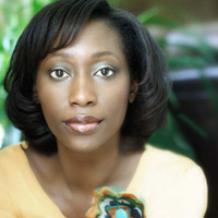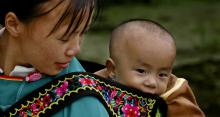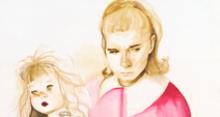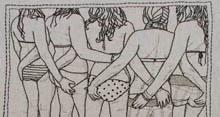What Makes a Good Mother?
Big Ideas
Leading thinkers and activists share game-changing ideas about motherhood and improving maternal health and women's rights.

“What makes a good mother?”
What a provocative question! My perspective is shaped by observations of life in Nigeria where the journey to motherhood is fraught with risk for the majority of women. According to UNICEF, 60% of Nigerian women do not have a birth attendant during delivery; one dies every 10 minutes due to complications from pregnancy and childbirth and more than 500 newborns die daily. If both mother and child scale the daunting obstacles of inadequate care, seeing that child grow beyond the age of 5 to become a healthy, functioning adult is still a challenge considering that 90% of the population lives on less than $2 per day and immunization rates hover at around 30%. The first wife of my paternal grandfather had 7 sets of twins (the Yorubas have one of the highest incidences of twin births in the world). All seven sets died before the age of five, several sets before their naming ceremony which takes place 7 days post-birth.
Motherhood should not be a superhuman task, but in Nigeria, successful motherhood is often only for the lucky women who happen to have the money and determination required to forge a supportive environment for themselves. My mother was such a woman. Married to a successful businessman at the age of twenty, she was the second of four official wives in a polygamous household in Lagos, the then capital of Nigeria. Sharing a husband was hard, but having several adults around (which included aunts and uncles) meant sharing household tasks, making the rearing of children that much easier. The environment was such that my mother was not only able to have and raise seven children, but she was also able to pursue a career, thereby establishing her financial independence, and later her ability to contribute to social and political issues in my country.
Now I am a mother myself of two little angels, a boy of 5 and a girl of 3. Unfortunately, our globalized economy means that my siblings, in-laws, and other family are spread out all over the world and it is no longer as easy to weave the kind of long-standing community made of extended family members that my mother called upon when raising her own children. Instead of having several uncles and aunts to rely on, the only stable factor in my children’s lives are my husband and myself. Even where we live changes, since my husband Nick’s job has involved relocating from Nigeria to China and now Belgium over the past 7 years. In such an environment, it is so easy for me to focus on raising the children in isolation to everything else. Indeed, in each new place, I have found other mothers (seldom fathers) similarly displaced, who form a small group, especially around the playgrounds. Yet, while I enjoy the many little activities that make up mothering – nursing my two when they were first born, picking them up from school, cooking them different dishes and arranging fun and educational activities for them over the weekends – my mother taught me differently.
Reflecting on the social pressure on mothers to restrict themselves to only raising children, my mother always said that a mother also owed it to her children to go out to make sure that the world was good enough for them. So that even as the needs of my children pull me to our home, those of other children push me out as well. Daily, I read about other children who struggle against the odds. So many don’t make it; like the boy in a Lagos public school who drowned in faeces when he fell into a pit when trying to poo (many schools don’t have proper toilets). Arundhati Roy is quoted as saying “a new world is waiting to be born.” One hopes it is a more equal world; but who will be responsible for helping birth this new world when all the mothers are too busy?
Recently, driven by the need to secure some measure of economic independence for myself as much as by my commitment to social justice, I decided to take a job in my home country. It seemed like an extreme thing to do, considering that my family is based in Belgium. Yet, the job allows me to oversee all the projects aimed at attaining the UN’s Millennium Development Goals in Ogun, the state that surrounds Lagos, which has a population of 4.5 million people. Only five months in, I am gratified by how much impact I can have here. In a matter of weeks, we will roll out a pilot antenatal and immunization program to 60,000 women and children under five years old in three of our 20 local government areas. In another three areas, we are investing about $4 million to provide sanitation facilities, clean water systems, build new schools and health centers, and renovate existing ones. And we have projects that are statewide. In one of the locations where solar lights were installed in a rural village, a child said, “Now we are seeing sunlight in the night.” With the “sunlight in the night,” this boy will be able to do his homework in the evenings, and perhaps read some of the same books as my son, Khalil.
I was able to negotiate a work schedule that has me in Brussels for a few weeks every other month, and my husband and I arrange for the family to spend the school vacations together, usually in Nigeria. During the children’s school year, we hire a nanny to support Nick, who prefers, for now, that the kids stay in Brussels. Sometimes, I wonder though, if I’m being a bad mother by working in Nigeria while my family lives in Brussels. One of my children’s teachers expressed her concern that my job took me away from my kids too often, saying that it couldn’t be good for them. I can understand why she should be concerned. Yet, two beliefs argue for staying the course.
First, I believe that child rearing calls for a village (an enabling community, if you like) and should not be made the sole responsibility of one or two individuals. The challenge in our globalized economy is to be able to craft stable communities out of the soil in which we live. My close friends in Brussels and I discuss this all the time, and are even considering living close to one another (and around our children’s school), since proximity aids our goal of supporting one another. And second, I believe that motherhood is not a call to martyrdom. Just because a woman is a mother does not mean that she should give up on or delay her dreams; such an approach might foster resentment towards one’s children. Instead, it is an opportunity to model interdependence within the family and in the world, for just as men have historically had the opportunity to be fathers and citizens, so also should women have the same right and responsibility.
Fortuitously, shortly after my child’s teacher spoke to me about my frequent absences, it was the end of the school year, and the children came to live with me for a few months, making it possible to care for them every day while working as well. Perhaps one day it will be possible to work in the same place where my family live, but whatever happens, the balance I continue to seek is one that allows me to keep one foot in my children’s current lives and the other in the world that they will one day enter into.
Related Content
|
Artist Shira Richter, a mother to twins, uses her own body as a medium for her art. She discusses the message she's aiming for, and the surprising responses she receives. |
The past century has brought more abundant choices for many of the world’s women, but when it comes to motherhood, the choice seems to be "all or nothing." |
Catherine Haley Epstein’s paintings touch on the many ways women’s identities shift and change when they become mothers. |
Kathy Halper's tongue-in-cheek, Facebook-inspired embroideries explore how technology affects the modern mother/child relationship. |





